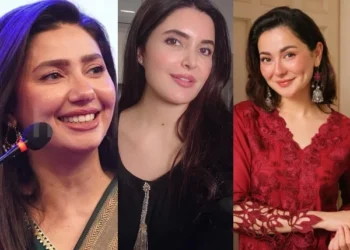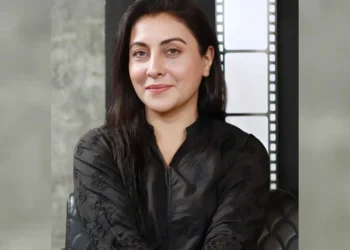In a recent interview that has stirred debate across social media, Indian actress and model Nausheen Ali Sardar disclosed a personal experience that highlights the ongoing challenges of religious discrimination in India. The actress revealed that despite her success in the entertainment industry, she faced rejection in her search for a life partner simply because of her Muslim identity.
This revelation not only sheds light on Nausheen’s personal struggle but also raises broader questions about India’s claim of being a secular democracy, where equal opportunity should ideally transcend religious boundaries.
Who is Nausheen Ali Sardar?
Born in Mumbai, Nausheen Ali Sardar, now 43, is a familiar face to many television and cinema audiences. She gained immense popularity through her performances in Indian dramas and modeling projects. Her versatility has earned her respect in the entertainment industry, and she remains a known personality with a loyal fan base.
Despite her professional success, Nausheen, like many women in India, has faced societal challenges in her personal life—especially when it comes to marriage and relationships.
The Shocking Revelation: Denied Marriage Prospects
Speaking on YouTuber Siddharth Kannan’s show, Nausheen revealed that during the COVID-19 pandemic, she sought help from renowned Indian matchmaker Seema Taparia—a figure who gained international fame through the Netflix series Indian Matchmaking.
According to Nausheen, when she approached Seema with the hope of finding a compatible life partner, she was met with rejection. Shockingly, Seema refused to assist her solely on the basis of her being Muslim.
Nausheen explained:
“I had assured her that I am willing to marry into any Catholic, Sikh, or Punjabi family. But the answer I got was, ‘We cannot find a relationship for you because you are Muslim.’”
This statement underscores how deeply entrenched religious bias still is, even in a country that prides itself on diversity and secularism.
A Blow to India’s Secular Identity
India’s constitution enshrines the principle of secularism, promising freedom of religion and equal rights to citizens regardless of their faith. However, Nausheen’s experience brings into question the gap between constitutional ideals and social realities.
Despite being one of the most religiously diverse nations in the world—home to Hindus, Muslims, Sikhs, Christians, Buddhists, Jains, and Parsis—India continues to face challenges in addressing religious intolerance.
Nausheen’s rejection highlights the silent barriers that Muslims, especially women, encounter in areas such as:
- Marriage and matrimonial services
- Housing and property rentals
- Employment opportunities
- Social acceptance in elite circles
Why Nausheen’s Case is Significant
Celebrity voices often resonate more loudly than those of ordinary citizens because they reach wider audiences. Nausheen’s disclosure matters because:
- She belongs to Bollywood and Indian television, industries that often claim to transcend caste and religion in the name of art.
- Her case exposes how even affluent, educated, and successful Muslim women face discrimination in personal matters such as marriage.
- The incident involves Seema Taparia, a prominent matchmaker with global recognition, which magnifies the controversy.
Seema Taparia: The Matchmaker in the Spotlight
Seema Taparia, popularly known as “Seema Aunty,” rose to international fame through the Netflix show Indian Matchmaking. She has often been both praised and criticized for her traditional views on marriage, including issues like caste, family background, and social compatibility.
Nausheen’s revelation that Seema outrightly rejected her due to her religion raises concerns about bias within matrimonial services. What makes the case even more striking is that Seema’s own family background is mixed—her father is Punjabi and her mother is Iranian. This contradiction makes Nausheen’s rejection appear even more unjustifiable and hypocritical.
Religious Discrimination in Marriage: A Broader Reality
Nausheen Ali’s experience is not an isolated incident. Across India, stories frequently emerge about religious discrimination in marriage and matchmaking. Interfaith marriages often face resistance from families and society, sometimes even leading to violence or “honor-based” opposition.
The controversial discourse around “Love Jihad”—a term used by some political and social groups to discourage Hindu-Muslim marriages—has only fueled further polarization. This environment makes it especially difficult for Muslim women to find acceptance in non-Muslim families, regardless of their professional achievements or social status.
Bollywood and Religion: A Contrasting Reality
Bollywood has long portrayed itself as a symbol of secular unity, often celebrating Hindu-Muslim friendships, romances, and marriages on screen. Many legendary Bollywood couples—such as Shah Rukh Khan and Gauri Khan, or Saif Ali Khan and Kareena Kapoor—are products of interfaith unions.
Yet, behind the glamour, even celebrities face backlash and scrutiny. Nausheen’s revelation shows that religious identity continues to play a divisive role in personal relationships, even among India’s elite.
Nausheen’s Emotional Response
Nausheen described her experience as “very sad and disappointing”, emphasizing that she never expected to be denied a chance at companionship solely because of her faith.
She said:
“Even today, in a diverse country like India, it is heartbreaking to be discriminated against on the basis of religion.”
Her statement reflects the disillusionment many Indians feel when faced with the contradiction between India’s secular image and its social realities.
Impact on Muslim Women in India
Muslim women in India often face double discrimination—first for their gender and second for their religion. While women across all communities deal with patriarchal expectations in marriage, Muslim women are particularly vulnerable to being sidelined in matchmaking processes.
Nausheen’s story highlights the fact that financial independence, beauty, and fame cannot shield one from prejudice. For many Muslim women, barriers exist not just in conservative settings but even in so-called modern, progressive spaces.
Public Reaction to Nausheen’s Revelation
Since her interview, Nausheen’s comments have sparked widespread discussion online. Many netizens expressed support for her bravery in speaking out, while others condemned the hypocrisy of India’s secular claim.
Critics argue that celebrities must use their platforms to raise awareness about systemic issues, while supporters see Nausheen’s statement as a much-needed reminder of the challenges faced by marginalized communities.
A Call for Change
Nausheen Ali’s case is a wake-up call for India to re-examine its social values. If discrimination can be openly practiced by high-profile figures like Seema Taparia, it reflects a deeply ingrained bias that needs to be addressed.
For India to truly embrace secularism:
- Matrimonial platforms and matchmakers must be held accountable for discriminatory practices.
- Awareness campaigns should promote interfaith harmony and inclusivity.
- Celebrities and influencers must continue to speak up against bias.
Conclusion: Nausheen Ali Sardar’s Courage
Nausheen Ali Sardar’s candid revelation has reignited conversations about religion, identity, and marriage in India. By sharing her story, she not only highlighted her personal struggle but also gave a voice to countless Muslim women who quietly face similar discrimination.
Her courage in speaking out is a reminder that while India celebrates diversity on paper, it must do more to ensure that this diversity is respected in everyday life. Until then, the country’s secular image will remain incomplete.
In the end, Nausheen’s story is not just about rejection in a marriage proposal—it is about the struggle for dignity, equality, and the right to love and marry freely, regardless of religion.

























